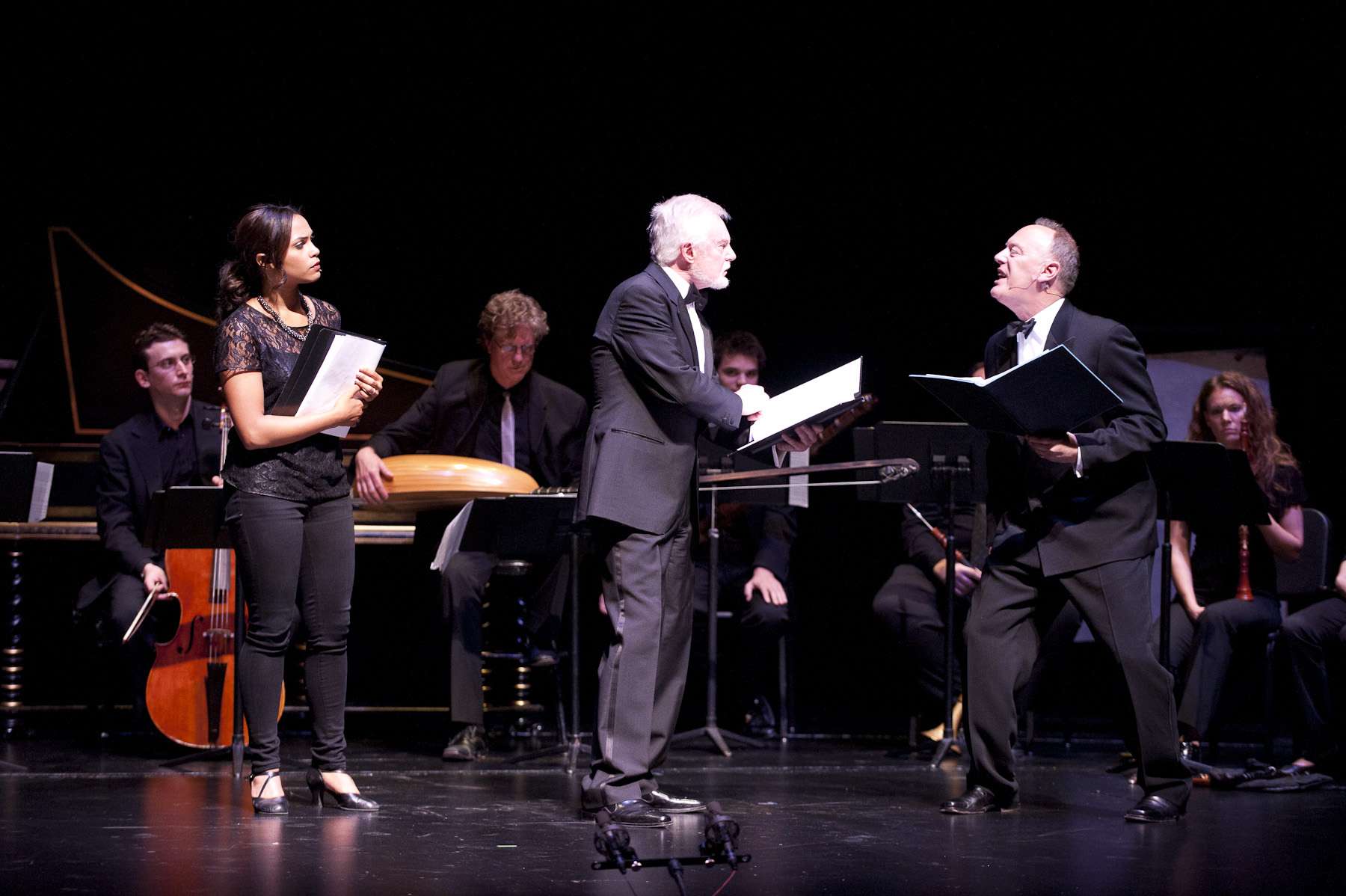|
Back
The Splendors of Shakespeare New York
Juilliard School: Peter J. Sharp Theater
06/13/2011 -
William Shakespeare: The Tempest (excerpts)
Songs and instrumental pieces by Matthew Locke, John Banister, Pelham Humfrey, George Frideric Handel, and Antonino Reggio
Sir Derek Jacobi (Prospero/Stephano), Monica Raymund (Miranda/Ariel/Trinculo), Richard Clifford (Caliban/Ferdinand), David Daniels (countertenor), Bob McDonald (baritone)
Juilliard 415, Beth Wenstrom (Music Director and Violin)
Richard Clifford (Stage Direction and Adaptation)

M. Raymund, D. Jacobi & R. Clifford (© Nan Melville)
All roads – at least my roads – seem to lead back to the Metropolitan Opera. Aside from the location of Juilliard – just across the road from the Met – two of the principals in this benefit performance have ties there, one directly (David Daniels) and one indirectly (Sir Derek Jacobi). Moreover, an incarnation of this play is about to make an appearance at the Met. Jacobi is a magnificent actor with an enormous range. In May. at BAM, I was privileged to see his magisterial and immensely moving King Lear in a production imported from London, splendidly directed by Michael Grandage. In Don Giovanni, one of seven new productions gracing the Met next season, all broadcast worldwide, live in HD, Grandage will make his house debut as director.
In this performance, a benefit for Juilliard Drama, Sir Derek was mesmerizing. His Prospero captured the essence and the complexity of Shakespeare's island monarch, displaying Jacobi's utter mastery of every nuance of the English language. His Stephano was a delightful drunk, played with a broad Cockney accent. Sharing the stage with Sir Derek and Juilliard's superb early music ensemble, Juilliard 415, were two other actors and two singers. Countertenor, David Daniels, was the chief musical draw of the evening and he certainly did not disappoint. About a week before I saw Sir Derek as King Lear, I attended the last performance of the season at the Met; it featured Daniels in Gluck's Orfeo ed Euridice. Again, here, especially in the Handel aria from Radamisto, Daniels sang with marvelous diction, lovely vocal color and sensitive phrasing. He will return to the Met next season in The Enchanted Island, a new production that is also a world premiere. With a libretto by Jeremy Sams and music by Handel, Vivaldi, Rameau and other composers, it is a pasticcio. And it's based on two of Shakespeare's plays, A Midsummer Night's Dream and The Tempest.
The Juilliard adaption of The Tempest is also a pasticcio. with period music mostly by Matthew Locke and additional contributions by Banister, Humfrey, Reggio and Handel. The whole concept belongs to Richard Clifford and, as he explained to the audience by way of introduction, his starting point was a 17th century entertainment written by Matthew Locke. Clifford removed Locke's text and inserted Shakespeare's. He added characters and two Handel arias. His goal was to connect the talents of singers and actors and the splendid young Juilliard musicians with the glories of Shakespeare. And he did. He also gave a splendid performance, particularly in his incarnation as Caliban.
Playing three characters with clear diction and dramatic commitment, Monica Raymund's American accent was not the least jarring. Vocally, all was well in hand with splendid singing by Daniels and a solid contribution from baritone Bob McDonald. “Go thy way,” the so-called echo duet by Banister, was a musical highlight, with its lovely word painting and the beautiful vocal blending of the baritone and countertenor voices. The young musicians of Juilliard 415, the performing ensemble of Julliard Historical Performance, the school's newest musical program of study, were terrific.
This benefit performance was streamed live at wqxr.org. It will be rebroadcast on WQXR 105.9 FM on Sunday June 26 at 4 PM EST. If at all possible, do tune in.
Arlene Judith Klotzko
|